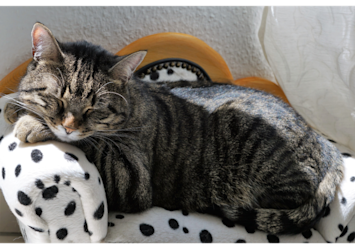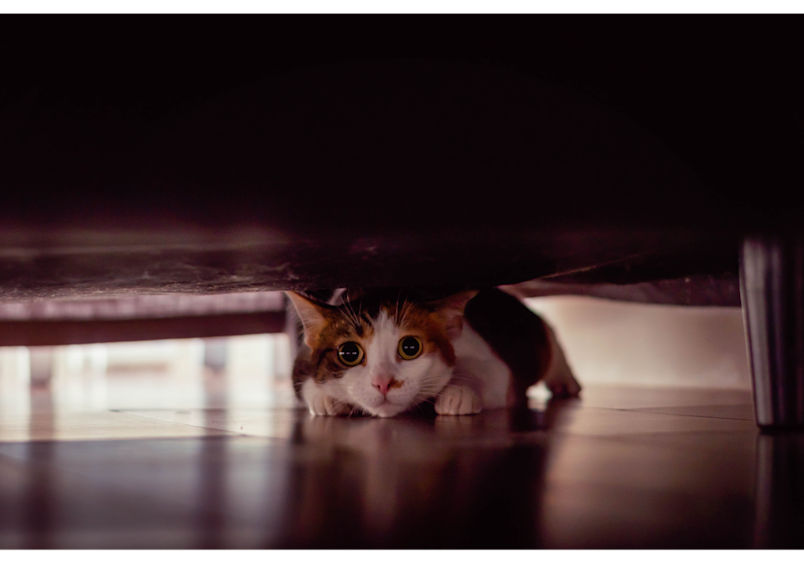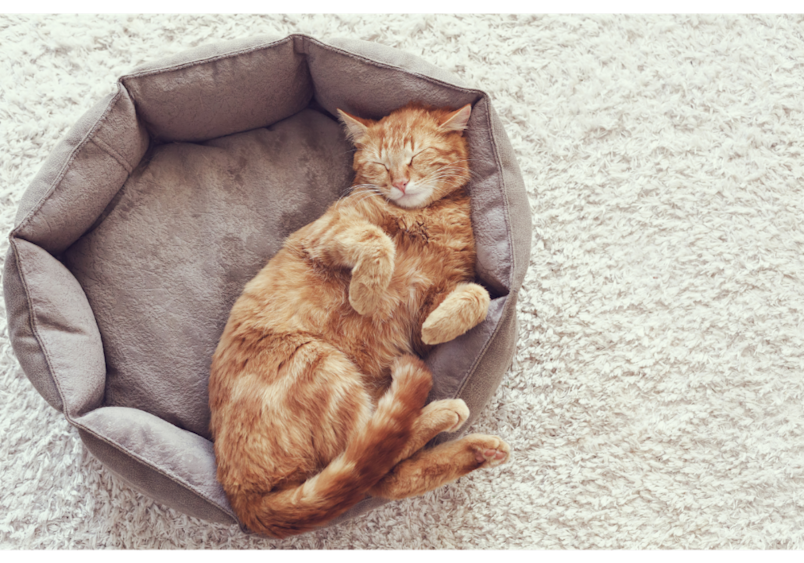
Cats are often thought of as ninjas with night vision, allowing them to stay up at all hours of the day, keeping you awake at night. But the truth is, cats aren’t truly nocturnal, rather they follow a crepuscular rhythm that has them more active during the low-light hours of the day, mainly around dawn and dusk, and then sleeping during the middle of the night and day.
So, while your cat may seem to be keeping you up at night, it’s more likely that they’re treating themselves to a later bedtime and an early wakeup while enjoying frequent naps throughout the day. Why does this matter? Mostly because the things you may be doing to get a little more shuteye for yourself could be going against your cat’s natural rhythm.
Are Cats Nocturnal?
We couldn’t start answering this question without a few definitions first.
Nocturnal animals: Most active at night
Diurnal animals: Most active during the day
Crepuscular animals: Most active during early morning and late evening hours when light is low
Their visual ability as well as their natural hunting behaviors are the main drivers behind this feature. Though it may seem like your cat stays up all night, most of them follow a more crepuscular pattern.
When Are Cats Most Active?
Some cats save their wildest antics for when their human is asleep. They like to do the thing that makes the most noise or that requires them to run across your bed at top speed. This isn’t passive aggressiveness on your cat’s part, it’s just their normal cycle. Cats aren’t truly nocturnal, instead they utilize the twilight hours of dawn and dust to get their movement, feeding, and playtime in.

Why are Some Cats Active at Night?
Now, if nothing else, cats like to buck tradition and stand out from the crowd, so some may be more active at night. Again, it’s not some form of human torment, it may be because they’re not getting enough exercise and mental stimulation during the day. Their extra energy has to get out sometime, and they may want to include you, especially if you’ve been gone and haven’t been able to give them enough attention.
Variation Among Individuals
Every kitty has their own unique personality, so if your cat doesn’t conform, it doesn’t necessarily mean something is wrong. Some cats may prefer more activity during the day or during the night. Some cats will also adapt more to their human’s schedule, especially if you’re able to give them exercise and playtime when you are home.
Why Are Cats Crepuscular?
A cat’s vision is both similar and very different than our own. A few unique features allow them to see fairly well in low light conditions. While they are not able to see in total darkness, they can make out shapes and movement better than we can when the sun is just starting to come up or to go down.
Couple that with a cat’s main prey—small rodents—being most active during the low light hours, and you have a few good reasons for cats to be crepuscular rather than diurnal or nocturnal.
Though our domestic feline’s next meal isn’t affected by a mouse’s behavior, they still have the excellent low light vision and natural circadian rhythm of their wild relatives. This means that your kitty may choose late evenings to get their daily exercise or early mornings to beg for a meal.
Managing Your Cat’s Night-Time Behavior
If your cat verges on nocturnal more than the norm, it doesn’t mean your sleep has to suffer. There are ways to help your cat rearrange their schedule in order to sleep more when you do.
Create a Cat-Friendly Sleep Environment
Cats can be pretty particular about where they sleep. So, providing them with a comfy bed is a good start. Focus on a size and type that suits your cat’s sleep style. This may mean a cave type bed if your cat likes their privacy, or a hammock if they like to be in the middle of it.
Along with a comfy bed, make sure the space is quiet and dark. No one wants to sleep under the bright glare of a streetlamp through the window or hear the sound of the garbage truck early in the morning. Tuck your cat in an out of the way area where they can retreat at bedtime.

Shift Your Cat’s Schedule to Align with Yours
Getting your cat on your schedule is the next step. Feed them right before bedtime so they’ll be less likely to wake you up early with a growling tummy. Provide them with lots of interaction and stimulation, as well as some good communal downtime, during the day so that their physical and mental needs are fulfilled.
What Can I Give My Cat to Sleep at Night?
While you may take a sleeping pill or diffuse essential oils to help your sleep, these aren’t really the best options for your cat. Are essential oils safe for cats? As a general rule, no, most of them aren’t and those that are safe come with some serious stipulations. The same goes for sleeping pills. You shouldn’t give your cat any type of medication unless instructed by your veterinarian.
Instead, you may start with a little play session, let them get their energy out. After that, work on calming with some nice petting or grooming. These also have the bonus of allowing some bonding time between you and your cat, which may be something that’s been keeping them up at night. If this is a recurring issue even after providing plenty of stimulation during the day, ask your vet about calming aids, such as supplements or pheromones.
Enhancing Your Cat’s Well-Being
Sleep is an important factor in good health, so it’s important to address your cat’s nighttime behaviors if they’re upsetting your sleep. Start by seeing your veterinarian. Make sure there isn’t a health issue that’s causing your cat to wake frequently at night. This could be anything from a urinary tract infection to a digestive issue to anxiety. This is especially important if this is a new behavior, as it may signal an underlying medical issue.
Benefits of Pet Insurance for Managing Health and Behavior
If a health issue is behind your cat's nighttime antics, dealing with the bills can really keep you up. Fortunately, pet insurance for cats can help cover some of the costs related to an unexpected injury or illness. For example, if it’s a condition like a urinary tract infection that’s keeping your kitty up at night, it can easily run up to $4000 with emergency vet fees if there’s a blockage, which is why having cat insurance in place before anything happens is so important.
Did you know that older cats can be more prone to the kind of health issues that mess with their sleep, like arthritis or even feline dementia? That’s why pet insurance for older cats is a great option as they navigate the unique health challenges that come with aging.
Regular veterinary care, including checkups and vaccinations, is the best way to ensure your cat stays healthy, but it can also become expensive, so adding on an optional wellness rewards plan can make sure your cat continues to get all of the preventative care they need to stay healthy and to get back to sleeping normal hours!
And what can help you sleep better at night? Knowing that you never want to have to choose the medical care you can afford rather than the care your cat needs.
Are Cats Nocturnal?
Though your cat may reserve their most impressive antics for nighttime, they are not considered nocturnal. Instead, cats tend to be crepuscular, meaning they’re most active during the twilight hours of dawn and dusk. What does this mean to you? Harness your cat’s natural activity by providing them with plenty of exercise and mental stimulation during their awake hours so that both you and them can sleep better at night.